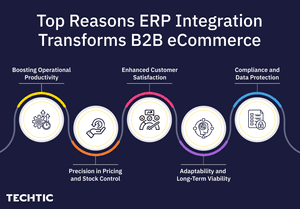ERP Integration is a Game-Changer for B2B eCommerce – You Know Why?
Sector: Digital Commerce
Author: Nisarg Mehta
Date Published: 01/08/2025

Contents
The digital move has impacted how B2B businesses are run, demanding faster processes, seamless customer experiences, and quicker supply chains. With growth, however, comes complexity: inventory mismanagement, siloed data, and broken workflows can hit any business, even the most seemingly successful. The answer is ERP integration, which combines operations, automates repetitive work, and delivers real-time insights to help companies scale up smoothly.
Optimizing inventory and reducing operational costs can be done quickly by the successful integration of ERP and help US B2B businesses reach that elusive sweet spot in their bottom line. In this article we will shed light on why ERP Integration is more than just a technological upgrade, it’s a paradigm shift happening in defining the ways businesses are surviving in the digital world.

Enhancing Operational Efficiency
Efficiency is critical to survival in B2B eCommerce. Natural, manual processes slow everything down as orders ramp up and supply chains get more complex, triggering bottlenecks that frustrate customers and tread on internal teams. This complexity can be cut down using ERP integration as it helps automate order entries, invoicing, and inventory management. The result? Fewer errors, faster processing, and teams focusing on their strategy rather than paperwork.
For instance, our clients that have integrated ERP systems with their eCommerce platforms often report up to a 30% reduction in operational costs by minimizing redundant workflows and streamlining data flow across departments. This efficiency boost extends to order fulfillment as well. With real-time inventory visibility and automated reordering, companies can reduce lead times and prevent costly stockouts—creating a smoother experience for clients.
The numbers back this up. Gartner predicts that by 2024, 65% of B2B organizations will be prioritizing data-driven decision-making capabilities as a key element of their eCommerce growth strategies. To sum it all up, as the competition intensifies, operational efficiency is becoming the line between businesses that scale and those that stagnate.
Accurate Pricing and Inventory Management
Managing thousands of SKUs, dynamic pricing models, and fluctuating inventory without an ERP system often results in errors that ripple across the entire supply chain. ERP integration solves this by centralizing data, ensuring real-time accuracy in both pricing and inventory levels.
When pricing strategies are automated and linked directly to the ERP, businesses can dynamically adjust prices based on demand, bulk orders, or customer-specific agreements—without manual oversight. This allows for personalized pricing structures, strengthening client relationships and boosting margins.
Inventory management benefits just as much. ERP systems provide a live view of stock levels across multiple warehouses, flagging low inventory and triggering automatic restocking before shortages occur. This not only prevents overstock or understock scenarios but also improves cash flow by optimizing storage costs.
Consider this: US eCommerce sales topped $1.3 trillion in 2023 and in the age where order volumes are increasing, the need for real-time inventory tracking can be invaluable. By integrating ERP, businesses can cut excess inventory by as much as 20 percent and decrease fulfillment errors outright, which can only help reduce costs and increase profit.
By synchronizing pricing and inventory, ERP systems position B2B companies to operate with precision—ensuring that products are always available at the right price, at the right time.
Improved Customer Experience
An incorrect invoice, delayed order, or running out of stock can damage even the best client relationships. This is addressed by the ERP integration which results in an uninterrupted movement of information from the e-commerce front end to integrate it with the backend systems thereby forming an accurate information flow, fast ordering process as well as coherence of communication.
One of the standout advantages is personalization. With ERP systems pulling detailed customer data—such as order history, preferences, and special pricing agreements—businesses can deliver tailored experiences that go beyond generic interactions. For example, clients can log into portals displaying custom pricing, real-time stock availability, and shipment tracking specific to their needs.
ERP fosters customer loyalty and retention by having this level of transparency and customization. Forrester reports that 73% of B2B buyers now expect the same degree of personalization in B2B interactions as they would experience in B2C environments, thus making ERP integration not just a luxury, but a need to compete.
Moreover, consistency across channels is also important. The reality is that no matter how customers do business with you—orders made online, via sales reps, or in person—your ERP software will ensure a unified experience from every touch point. This discourages mistakes and builds a brand reputation.
The takeaway is simple—by enhancing the customer experience with ERP integration, businesses are more likely to drive repeat orders and secure long-term contracts, directly impacting revenue growth.
Scalability and Future-Proofing
B2B e-commerce companies require systems that grow along with them. Fragmented processes, when product lines are expanded when you enter new markets, or when you work with larger customer bases, become an impediment to operational improvement. ERP integration allows this scale to take place without compromising efficiency.
Another great strength of ERP systems is their modular design. Businesses can start with the essentials like inventory and order management and hop on to more advanced capabilities like demand forecasting or multi-channel sales management when needed. Combining flexibility also means that businesses won’t outgrow their system, making it costly to overhaul or interrupt business.
What’s more, companies with integrated ERPs can adjust to market fluctuations rapidly. From riding the seasonal demand spikes to reacting to supply chain disruptions, integrated systems are agile enough to be able to change direction in real time. Being able to adapt quickly is essential to long-term success in highly competitive industries where responsiveness can be the difference between owning market share or not.
For example, our clients that implemented ERP-driven scalability reported a 22% faster expansion into new markets and a 35% reduction in operational delays during growth phases. These systems allow leadership to focus on strategy and innovation rather than firefighting logistical challenges.
By future-proofing operations, ERP integration positions B2B companies to not only meet current demands but thrive in the face of future growth and market changes.
Compliance and Data Security
While digital transactions can scale, so can the risks: data breaches, audit failures, and regulatory penalties can put a stop to operations, and damage client trust. ERP integration is key for securing both security and compliance by centralizing data and automating such governance processes.
ERP systems present a single source of truth by consolidating data across departments. Due to this, it minimizes the chances of errors during the audits and warrants the records to comply with the regulatory standards uniformly. Automated reporting and tracking features help businesses stay compliant with tax codes, trade regulations, and industry-specific mandates without relying on manual intervention.
In terms of security, ERP integration decreases vulnerability by removing silo data and providing advanced role-based access controls. The ERP system stores sensitive information (pricing agreements, customer data, financial records…) all encrypted and well-secured, minimizing exposure to cyber threats.
The impact is measurable. A study says that 60% of small to midsize businesses that experience a major cyberattack shut down within six months. The risk is reduced through ERP integration acting as a protective layer ensuring critical business data is under guard at every touchpoint.
ERP-driven compliance processes also help businesses pass audits with fewer errors and downtimes. With compliance being heavily regulated in sectors like manufacturing and healthcare, ERP systems can reduce audit preparation time by a whopping 40 percent so your team can focus on actual operations instead of going through the agony of finding proper documentation.
ERP integration not only drives up B2B security on data but also assures B2B companies that they are in compliance with regulatory frameworks, helping them to learn to be dependable and trustworthy partners in the eCommerce space.
Conclusion
Smart B2B companies realize that ERP integration is more than an upgrade, it’s a strategic shift in how they do business in the digital age. The benefits of Zebra Technologies to a business vary from automating workflows to having the right inventory where it matters most in the supply chain, to improving customer experiences, and more, across any part of the business. With competition heating up and operational complexity increasing, ERP systems are the scalable, secure, and efficient feature of modern B2B eCommerce.
The time is now to invest in ERP integration, giving your operations some future-proofing, helping your client relationships, and putting you ahead in the game in the changing eCommerce landscape.
We, at Techtic Solutions, have helped many B2B eCommerce enterprises transform their operations with cutting-edge solutions. If you want to implement ERP the right way without any downtime to your existing business functions, feel free to reach out to us.



